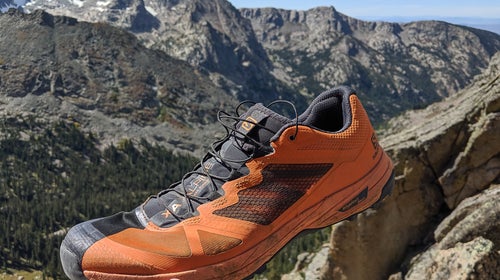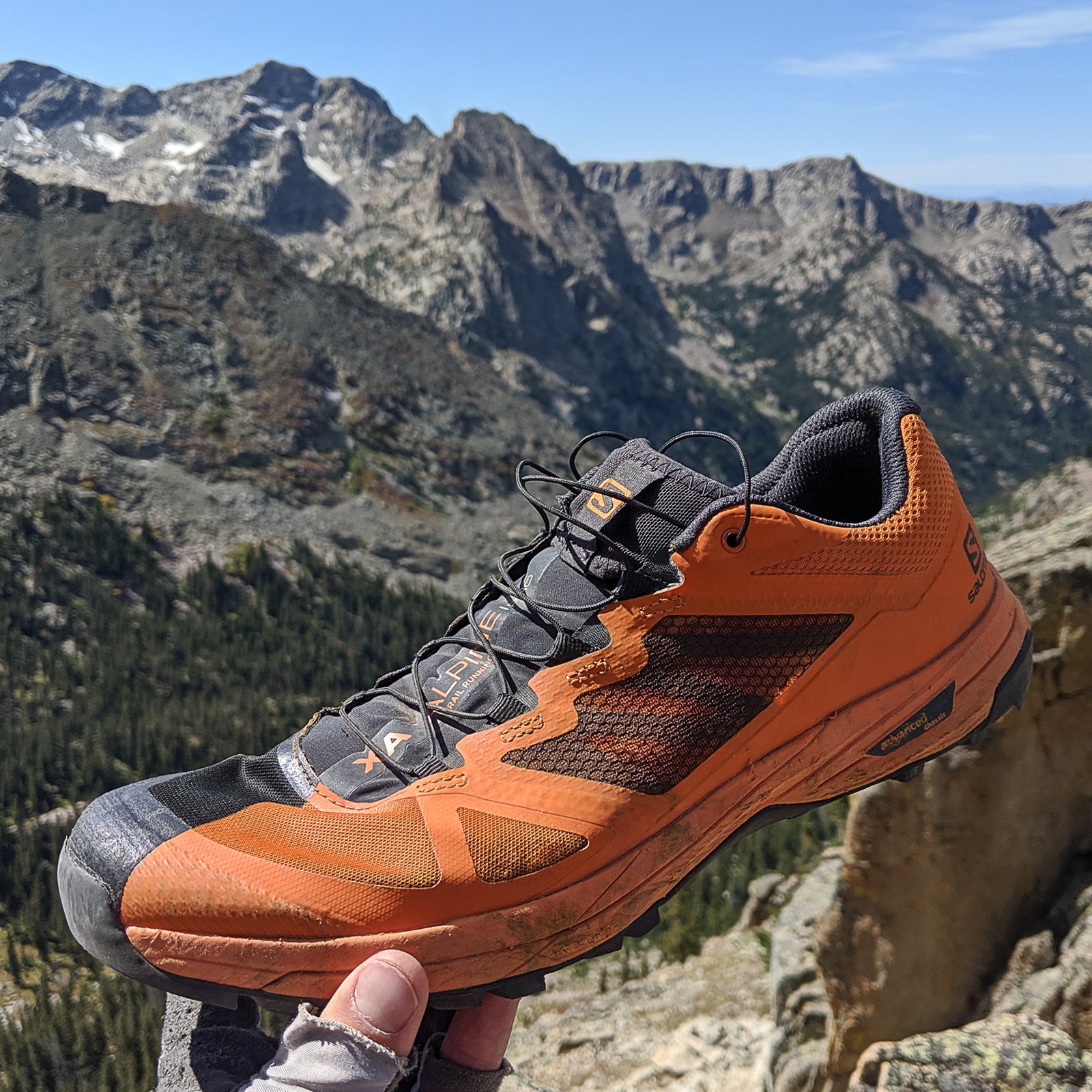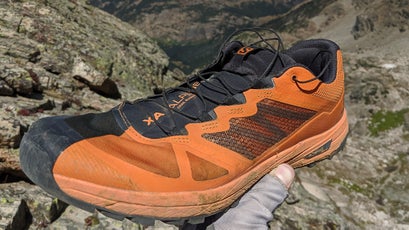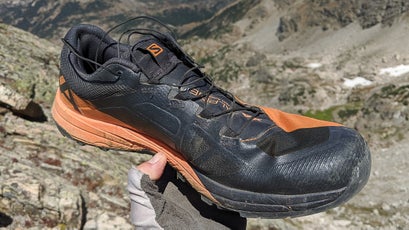For years IÔÇÖve been an enthusiastic user of Salomon trail-running shoes, with my all-time favorites coming from the Sense familyÔÇöthe╠ř,╠řSense Pro 2, and╠ř.
But Salomon has never broadly or successfully extended the winning features of its trail-running shoesÔÇönotably, the glove-like fit, the reliable outsole grip, and the╠řupperÔÇÖs best-in-class durabilityÔÇöto backpacking╠řor╠řcrossover categories like high routes and nontechnical scrambles. Its best entry might be the XA Elevate, which has been discontinued for 2020.
When I saw the ╠ř($160, 10.9 ounces) at Outdoor Retailer , I was hopeful it would help fill this void. Salomon sent me a pair in August so that I could size them up.
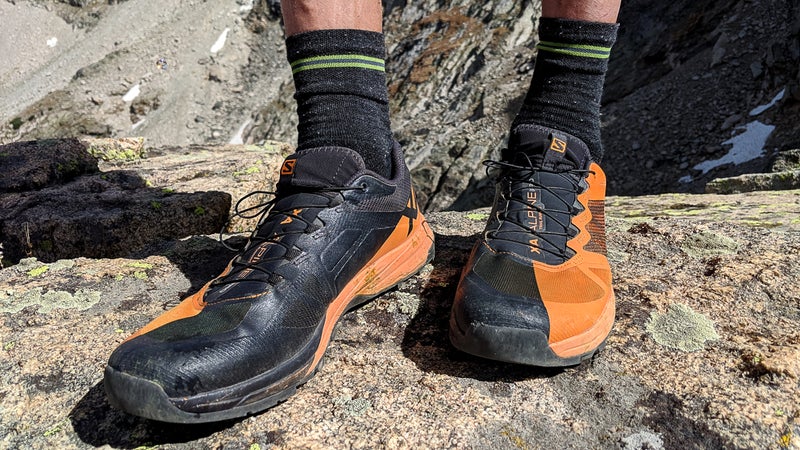
The X Alpine Pro is best suited for high-mountain running. To me╠řthat means long days, rocky and loose footing, prolonged ascents and descents, and a healthy share of hiking. IÔÇÖd consider it for the toughest-of-tough ultras, too, like Hardrock and ItalyÔÇÖs Tor des G├ęants.╠ř
Personally, I found the X Alpine Pro ideal during four recent adventure runs in Rocky Mountain National Park and the Indian Peaks Wilderness, all ranging from 20 to 35 miles,╠řwith 4,000 to 11,000 vertical feet of gain and╠řoff-trail terrain up to Class 3. These five-to-eleven-hour efforts would have pushed the limits of my aforementioned favorites, but the X Alpine Pro owned it.
As a backpacking and high-route shoe, the X Alpine Pro is definitely worth consideration. Compared to my go-to, La Sportiva Bushido II, itÔÇÖs more cushioned and roomy╠řand less stiff, so it performs relatively better on trail than off╠řand╠řwill fit more feet.
Key Product Specs
- Breathable upper with extra-thick TPU reinforcement
- Quick laces
- Endofit elasticized midfoot yoke
- 24-millimeter╠řstack height in the heel and 18 millimeters in the forefoot
- 6-millimeter╠řdrop
- Contagrip TA outsole with a wide ÔÇťclimbing zoneÔÇŁ lug under the toes
- 310 grams/10.9 ounces╠ř(menÔÇÖs size 9), 270 grams/9.5 ounces╠ř(womenÔÇÖs size╠ř7)
- $160 MSRP
Fit

The X Alpine Pro has a masterful fit, as IÔÇÖve come to expect of Salomon. The╠řheel locks down╠řsecurely, partly with the help of a sculpted foam collar. An elasticized yoke and a wide cushioned tongue hug╠řthe midfoot. And thereÔÇÖs╠řjust enough╠řvolume in the forefoot to avoid constriction while still maintaining control.
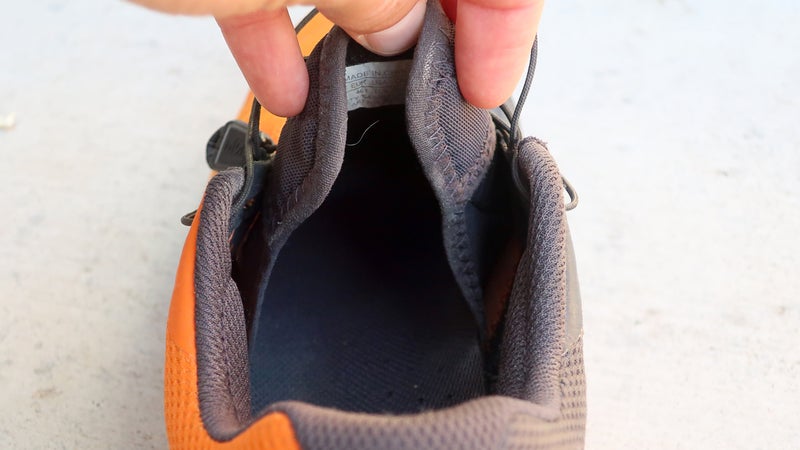
Compared to other Salomon models IÔÇÖve worn, the fit most closely resembles the original S-Lab╠řSense Ultra, which used to be SalomonÔÇÖs bestselling S-Lab╠řtrail shoe. In particular, the X Alpine Pro shares that roomy and rounded toe box╠řand has a Sense ProÔÇôlike heel and midfoot.
Ride
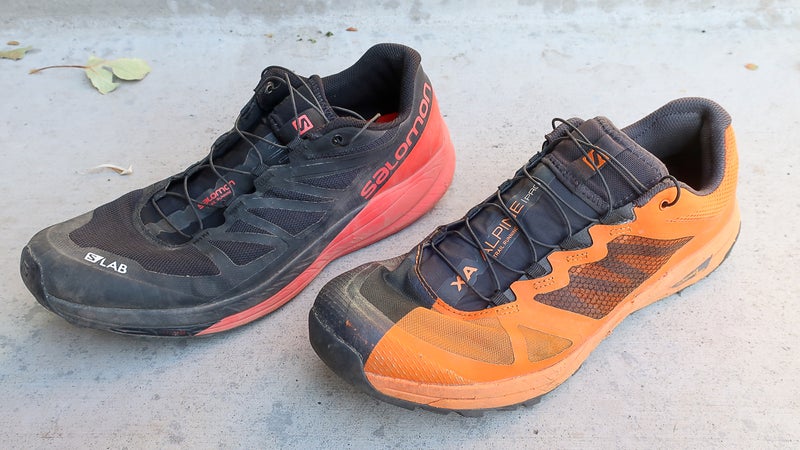
The X Alpine Pro is not as nimble as a pure trail-running shoe, but I found it surprisingly capable. In the midfoot and forefoot, itÔÇÖs actually more flexible than the Sense Pro 2 or S-Lab╠řUltra, which I think is largely explained by the absence of a film-on-mesh rock plate (ÔÇťProFeel╠řfilmÔÇŁ).
Not including a rock plate seems like an odd decision for an alpine╠řshoe. I wonder if, when combined with the 18-millimeter╠řstack height and large outsole lugs, the shoe was excessively stiff or insensitive during prototyping. Probably so╠řif SalomonÔÇÖs goal was to design an alpine running╠řshoe. Probably not╠řif its╠řgoal was to create an off-trail specialist.
ItÔÇÖs worth noting that the chief complaint among trail runners of the comparable Sportiva╠řBushido, which I think is better for╠řhigh routes than running, is that itÔÇÖs too stiff.╠ř
Upper
The upper uses SalomonÔÇÖs classic,╠řtime-tested mesh-and-TPU construction. But itÔÇÖs been ruggedized, with thicker TPU coatings, heavier-duty mesh, and a beefy toe bumper. Its breathability is satisfactory╠řbut not amazing; only fine dust gets through, and itÔÇÖs resistant to some splashing.
After about 100 miles on generally rocky trails, and a few miles through talus and scree, my uppers were entirely intact. I donÔÇÖt think the uppers will be the first failure point of the X Alpine Pro.
I did not submerge the X Alpine Pro in water, but I think the time its takes the shoe to dry╠řwill be slowish, due to the cushioned heel counter and tongue╠řand the mediocre╠řbreathability.
Grip
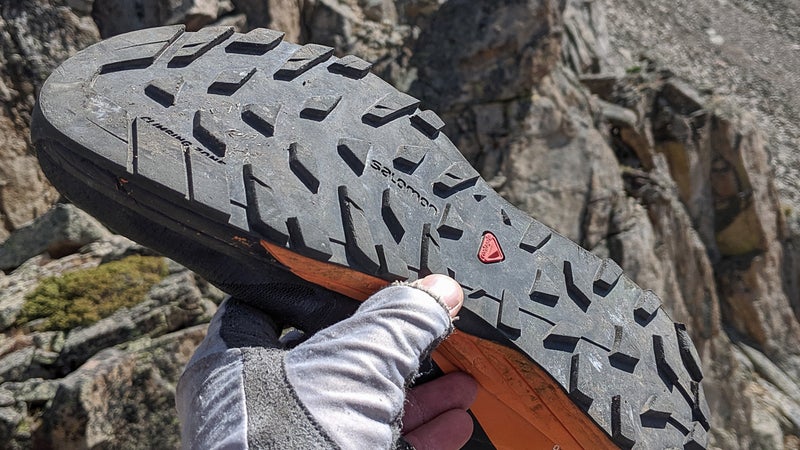
The outsole consists of large five-millimeter╠řlugs and is made of Contagrip TA, a trusted proprietary rubber thatÔÇÖs proven grippy and durable.
Unique to╠řthe outsole is the single, wide╠řclimbing-zone╠řlug across the toes. This approach-shoe-like feature sticks well to clean rock, but compared to a more conventional pattern of smaller lugs, I thought its performance was inferior on loose sand, mud, and wet grass.
